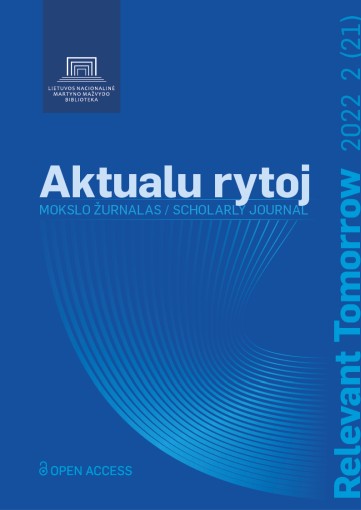Tarpukario Lietuvos politinis ir kultūrinis gyvenimas Tadeuszo Katelbacho publicistikoje bei raportuose
Rec.: Tadeusz Katelbach: atvirai ir slaptai apie Lietuvos politiką. I tomas, Atvirai / sudarytojai Marek Jabłonowski, Andrius Vaišnys, Ingrida Veliutė; iš lenkų k. vertė Biruta Mikalonienė, A. Vaišnys; įžanginio straipsnio (Lietuvos politika ir kultūra Tadeuszo Katelbacho pranešimuose) autoriai M. Jabłonowski, A. Vaišnys. Vilnius: Lietuvos nacionalinė Martyno Mažvydo biblioteka, 2023. – 456 p. ISBN 978-609-405-242-2; Tadeusz Katelbach: atvirai ir slaptai apie Lietuvos politiką. II tomas, Slaptai / sudarytojai Marek Jabłonowski, Andrius Vaišnys, Ingrida Veliutė; iš lenkų k. vertė Biruta Mikalonienė, A. Vaišnys. Vilnius: Lietuvos nacionalinė Martyno Mažvydo biblioteka, 2023. – 388 p. ISBN 978-609-405-242-3-9
DOI:
https://doi.org/10.51740/RT.2.21.3Reikšminiai žodžiai:
Tadeusz Katelbach, Lietuvos ir Lenkijos santykiai, XX a. pirmos pusės diplomatijos istorija, Vidurio Rytų Europos regiono istorijaSantrauka
Aptariamas dviejų tomų leidinys „Tadeusz Katelbach: atvirai ir slaptai apie Lietuvos politiką“. Jame pirmą kartą lietuvių kalba publikuojama 1934–1937 m. Lietuvoje dirbusio Lenkijos visuomenės ir politikos veikėjo, diplomato, žurnalisto, žvalgybininko Tadeuszo Katelbacho (1897–1977) publicistika ir Lenkijos užsienio reikalų ministerijai skirti jo slaptieji raportai apie sudėtingus politinius pasirinkimus, lietuvių ir lenkų tarpusavio santykius, Vilniaus ir Lietuvos sostinės klausimą, Lietuvos kariuomenę, ekonomiką, diplomatiją. Pirmame leidinio tome „Atvirai“ skelbiamas Mareko Jabłonowskio ir Andriaus Vaišnio įžanginis straipsnis, 1934–1937 m. laikraštyje „Gazeta Polska“ išspausdinti T. Katelbacho straipsniai ir korespondencija. Antrame tome „Slaptai“ pateikiami slaptieji raportai, saugomi Naujųjų aktų archyve Varšuvoje. Šis leidinys vertingas siekiant pažinti tiek Lietuvos vidaus politinį ir kultūrinį gyvenimą, tiek ir Lietuvos bei Lenkijos santykių aplinkybes XX a. 4 dešimtmetyje.
Downloads
Atsisiuntimai
Publikuota
Kaip cituoti
Numeris
Skyrius
Licencija

Šis kūrinys yra platinamas pagal Kūrybinių bendrijų Priskyrimas 4.0 tarptautinę licenciją.









